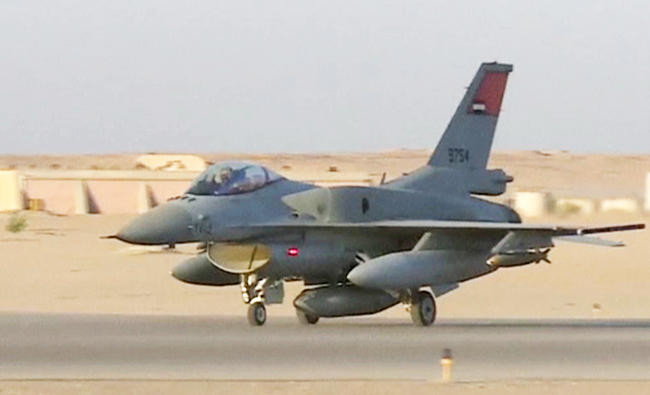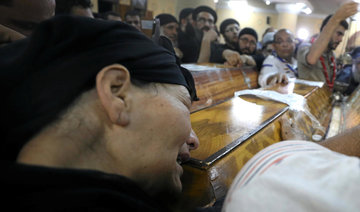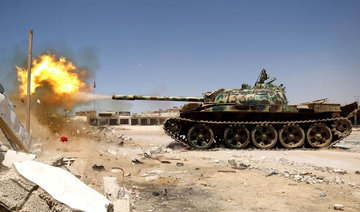CAIRO/BENGHAZI: Egypt launched a fresh round of air strikes over Libya on Saturday, Egyptian military sources and an eyewitness told Reuters, targeting militant camps it said were responsible for a shooting spree that killed dozens of Egyptian Christians.
On Friday, Egyptian fighter jets struck eastern Libya just hours after a shooting that killed 29 and wounded 24 in the southern Egyptian province of Minya when masked militants boarded vehicles en route to a monastery and opened fire at close range.
Daesh claimed responsibility for the attack, the latest directed at Egypt’s increasingly embattled Christian minority following two church bombings last month that killed more than 45, also claimed by the group.
President Abdel Fattah El-Sisi said on Friday he had ordered air raids on militant camps in Libya, where he said the Minya gunmen had trained, though he did not name a specific group responsible.
Sissi, who has presented himself as a bulwark against militants in the region, said Egypt would not hesitate to carry out additional strikes inside and outside the country to quash future threats.
Two military sources told Reuters that three additional air raids on Saturday morning struck the area of Derna, a city where east Libyan forces led by Khalifa Haftar, a close ally of Egypt, have been trying to gain control from militants and other opponents.
A source in Haftar’s Libyan National Army told Reuters that they had coordinated with Egyptian counterparts to strike ammunition stores belonging to the Derna Mujahideen Shoura Council, an Islamist umbrella group that opposes Daesh.
A resident in Derna told Reuters that warplanes were seen striking the Dahr Al-Hamar area in the southern part of Derna on Saturday. Egypt’s military spokesman declined to comment on the second round of strikes.
Egypt’s foreign ministry said it had delivered a letter on Saturday to the United Nations Security Council informing it that the strikes were conducted as an act of legitimate self-defense, according to a ministry statement.
Derna has a history of militancy and is where Daesh set up its first presence in Libya in 2014. However, the jihadist group was later chased from the city by local fighters and rival groups.
The east Libyan air force said Friday the strikes were targeting Al-Qaeda linked forces and did not mention Daesh.
Egypt’s military said in a statement it had “conducted several intensive day and night-time strikes” that successfully destroyed many targets, including training camps responsible for the Minya attack.
A video uploaded to the military’s Facebook page depicted fighter jets being armed with missiles and taking off as well as aerial footage of air strikes.
Egypt launches 2nd day of Libyan air strikes after attack on Christians
Egypt launches 2nd day of Libyan air strikes after attack on Christians

Egypt top diplomat meets PLO, urges Palestinian unity

The conflict began after the Palestinian militant group Hamas launched a surprise attack on Israel on October 7, 2023, triggering massive retaliation.
During his meeting with the PLO delegation in Cairo, Badr Abdelatty “reaffirmed Egypt’s supportive stance toward the Palestinian Authority,” his office said in a statement.
The minister also reiterated “Egypt’s rejection of any plans to displace Palestinians from their lands,” it added.
Last month, Egypt hosted talks between rival Palestinian groups Fatah and Hamas to discuss bringing post-war Gaza under PA control.
Fatah, which governs parts of the occupied West Bank under the PA, dominates both the PA and the PLO, an internationally recognized representative of the Palestinian people.
It has been excluded from Gaza since Hamas seized control in 2007.
On Thursday, Abdelatty also discussed with the PLO delegation Egypt’s efforts to end the Gaza war, reach a ceasefire agreement and facilitate the delivery of humanitarian aid to the Gaza Strip.
Mediators Egypt, Qatar and the United States have been engaged in months of talks to cement a truce in Gaza, but so far to no avail.
US Secretary of State Antony Blinken said on Wednesday that a Gaza ceasefire remained close but added it may not happen before President Joe Biden hands over to Donald Trump.
“I hope that we can get it over the line in the time that we have,” said Blinken, who leaves office with Trump’s inauguration on January 20.
Hamas said at the end of last week that indirect negotiations in Doha had resumed, while Israel said it had authorized negotiators to continue the talks in the Qatari capital.
A previous round of mediation in December ended with both sides blaming the other for the impasse, with Hamas accusing Israel of setting “new conditions” and Israel accusing Hamas of throwing up “obstacles” to a deal.
France congratulates new Lebanon president, calls for ‘strong government’

- French foreign ministry said Joseph Aoun's election “opens a new page" for Lebanon
PARIS: France on Thursday welcomed the election by Lebanese lawmakers of army chief Joseph Aoun as president after a two-year vacuum at the top, urging the formation of a strong government to drag the country out of a political and economic crisis.
Extending France’s “warm congratulations” to Aoun, the French foreign ministry said his election “opens a new page for the Lebanese” and urged “the appointment of a strong government” that can help the country recover.
Italian foreign minister to meet Syria's new rulers in Damascus

- Antonio Tajani said he would push Syria’s transitional government to pursue an “inclusive political process”
ROME: Italy’s Foreign Minister Antonio Tajani said Wednesday he would travel to Syria Friday where he plans to announce an initial development aid package for the country ravaged by years of war.
Tajani’s trip follows those by his French and German counterparts, who visited the Syrian capital last week to meet Syria’s new rulers after they toppled Bashar Assad's regime in a lightning offensive last month.
“It is essential to preserve territorial integrity and prevent (Syria’s) territory from being exploited by terrorist organizations and hostile actors,” Tajani told parliament.
Western powers have been cautiously hoping for greater stability in Syria, a decade after the war triggered a major refugee crisis that shook up European politics.
Tajani did not provide any details about what he called a “first package of aid for cooperation and development.”
Tajani said he would push Syria’s transitional government to pursue an “inclusive political process” that “recognizes and enhances the role of Christians as citizens with full rights.”
Ahead of his trip, Tajani is set Thursday to meet with the foreign ministers of France, Germany, Britain and the United States over the Syria situation, with the drafting of a new constitution and Syria’s economic recovery on the agenda.
The EU’s foreign affairs chief, Kaja Kallas, was expected in Rome for the meeting.
Thousands of Alawites mourn 3 killed by foreign Islamists: monitor, witness

- “Thousands of mourners gathered at the funeral of three Alawite farmers from the same family,” said the Syrian Observatory for Human Rights
- The civilians were killed on Wednesday in the village of Ain Sharqia
DAMASCUS: Thousands of Syrians from ousted President Bashar Assad’s Alawite community mourned on Thursday three civilians killed by foreign Islamist allies of the country’s new authorities, a war monitor and an attendee said.
Since Assad’s ouster, violence against Alawites, long associated with his clan, has soared, with the monitor recording at least 148 killings.
“Thousands of mourners gathered at the funeral of three Alawite farmers from the same family, including one child, killed by foreign Islamist fighters allied to Syria’s new authorities,” said the Syrian Observatory for Human Rights war monitor.
The civilians were killed on Wednesday in the village of Ain Sharqia, in the Alawite heartland of Latakia province, the Observatory said.
“Down with the factions,” some of those in attendance chanted in reference to armed groups, according to footage shared by the monitor.
Mourner Ali told AFP that people had called for those responsible for the killings to be punished and for foreign fighters to leave so that local policemen affiliated with the new authorities could take their place.
“We can’t have people die every day,” he said, asking to be identified only by his first name to discuss sensitive matters.
“We want security and safety to prevail; we support the transitional authorities. We do not want any more killings after today.”
Rami Abdel Rahman, who heads the Observatory, told AFP the mourners also demanded that Syria’s new rulers free thousands of detained soldiers and conscripts.
The Alawite community was over-represented in the country’s now-defunct armed forces.
On Tuesday, three Alawite clerics were also killed by unknown gunmen on the road from Tartus to Damascus, the monitor said.
Another cleric and his wife were found dead in the Hama countryside Thursday after they were abducted a day earlier.
Last month, angry protests broke out in Syria over a video showing an attack on an Alawite shrine, with the Observatory reporting one demonstrator killed in Homs city.
Syrian authorities said the footage was “old” and that “unknown groups” were behind the attack, saying republishing the video served to “stir up strife.”
The alliance spearheaded by the Islamist group Hayat Tahrir Al-Sham (HTS), which seized Damascus and ousted Assad on December 8 after a lightning offensive, has sought to reassure minority communities in the Sunni Muslim majority country.
Assad had long presented himself as a protector of minority groups.
Lebanon’s new president promises to rebuild what ‘Israel has destroyed’

- The Mediterranean country has been without a president since the term of Michel Aoun ended in October 2022
BEIRUT: Newly elected Lebanese president Joseph Aoun has promised to rebuild what the Israeli occupation has destroyed, in a speech before parliament after taking his oath of office.
The Lebanese state will be able to remove Israeli occupation and the effects of its aggression, Aoun said, after hurdling the second round of voting in parliament to become the country’s new president.
“I promise to reconstruct what Israel destroyed in the south and Beirut’s southern suburbs,’ he said.
The newly elected president also touched on the Palestinian issue, saying he rejects the settlement of Palestinian people and guaranteed their right to return.
He also pledged to work towards the best of relations with Arab countries, and cooperate with Syria to control the borders from both sides.
The Mediterranean country has been without a president since the term of Michel Aoun – not related – ended in October 2022, with tensions between the Iran-backed Hezbollah movement and its opponents scuppering a dozen previous votes.
During parliament’s first session on Thursday morning, 71 out of 128 lawmakers voted in favor of the army commander, short of the required 86, in the first round of the vote.
Thirty-seven members of parliament voted blank, including 30 lawmakers from the pro-Hezbollah bloc, according to a source close to it.
Twenty ballots were declared null and void.
Aoun received 99 votes during the second round, more than the minimum votes required for him to be voted into office.
But international pressure has mounted for a successful outcome with just 17 days remaining in a ceasefire to deploy Lebanese troops alongside UN peacekeepers in south Lebanon after a Hezbollah-Israel war last autumn.
Speaker Nabih Berri then suspended the session until 2:00 p.m. sparking outrage from some lawmakers who demanded an immediate second vote.
The president’s powers have been reduced since the end of the 1975-1990 civil war. But filling the position is key to overseeing consultations toward naming a new prime minister to lead a government capable of carrying out reforms demanded by international creditors.
Lebanon’s divided political elite usually agrees on a consensus candidate before any successful parliamentary vote is held.
Aoun, who will turn 61 on Friday, appears to have the backing of the United States and key regional player Saudi Arabia.
US, Saudi and French envoys have visited Beirut to increase pressure in the run-up to the vote.
Pope Francis on Thursday expressed hope that Lebanon could “possess the necessary institutional stability... to address the grave economic and social situation.”
Several lawmakers have objected to what they see as foreign interference in the vote.
In protest, some rendered their ballot void by voting for “sovereignty and the constitution,” a reference to the fact that Aoun’s election would also require a constitutional amendment.
Under Lebanon’s constitution, any presidential candidate must have not held high office for at least two years. Aoun is still head of the army, after extending his mandate past his planned retirement.
Critics have accused Hezbollah and allies of scuppering previous votes.
But a full-fledged war between Israel and Hezbollah last autumn dealt heavy blows to the Shiite militant group, including the death of its longtime leader Hassan Nasrallah in an air strike.
In neighboring Syria, Hezbollah has lost a major ally after militants toppled President Bashar Assad last month.
Under multi-confessional Lebanon’s power-sharing system, the president must be a Maronite Christian. Aoun is Lebanon’s fifth army commander to become president, and the fourth in a row.
Military chiefs too are, by convention, Maronites.
The new president faces daunting challenges, with the truce to oversee on the Israeli border and bomb-damaged neighborhoods in the south, the east and the capital to rebuild.
Since 2019, Lebanon has been gripped by the worst financial crisis in its history.
The Hezbollah-Israel war has cost Lebanon more than $5 billion in economic losses, with structural damage amounting to billions more, according to the World Bank.


















